Thing Disgusting
A chicken-and-waffle cupcake served from a food truck is some kind of recipe for a fatal hipster orgasm, right? I mean, I hope so. [Via]
The 6.4 California Earthquake of July 1, 1911 at 100
by Seth Colter Walls
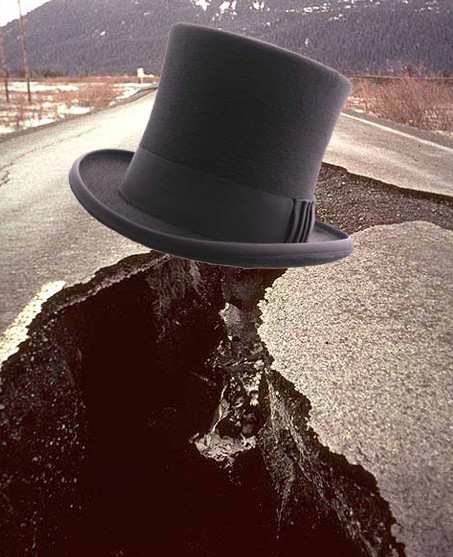
This morning, as I was walking down the street — on one of those uber-hyphenated strolls that freelance journalists colorfully like to describe as the “are-you-kidding-I-can’t-afford-to-take-a-cab” variety — I momentarily tripped across a small fissure in the concrete. And then I got to thinking about the 6.4 magnitude earthquake that rocked the Calaveras fault in California, back on July 1, 1911. Today, were that earthquake still alive and happening, it would be 100 years old. What a grand old dame it would be! I decided to put on my imagining hat.
First of all, the breakout it would represent on the complexion of the earth’s epidermis would, after 100 continuous years of rupture, likely appear quite large. By now, the chasm might have been steep or wide enough for us to have thrown all of our domestic and international problems into. Goodbye, the snakily complicated jurisprudence of military tribunals! We could have just thrown “enemy combatants” down the 6.4 California Earthquake of July 1, 1911, had it still been kicking during the Global War on Terror.
And I sure got the sense it would have known what to do about 9/11, too.
Mostly however, I like to think about how the 6.4 California Earthquake of July 1, 1911 would have probably had no thoughts at all about the British Royal Family. I like to imagine walking up to the precipice of a fault line that had continuously been terrorizing man-and woman-kind for a full-on century, and asking it about, say, the attractiveness of Pippa Middleton.
“Who?” the 6.4 California Earthquake of July 1, 1911 would say to me. (This, as hordes of concussed and bloodied locals who had still been raising families for generations near the fault-line — “It’s where we make our stand,” they would tell the occasionally visiting TV crews — stagger dizzily past me.)
“I’m a real game-changer,” the 6.4 California Earthquake of July 1, 1911 would say, adding. “Fault lines, baby — we’re the real movers and shakers on this planet. Oh hello, Gorby!”
What an intoxicating scamp! It’s almost hard for me to go back to a world in which I can’t imagine that the 6.4 California Earthquake of July 1, 1911 is still with us.
Seth Colter Walls really does enjoy imagining.
Alleged DSK Rape Victim Knows Bad People and Also Drinks!
Alleged DSK Rape Victim Knows Bad People and Also Drinks!
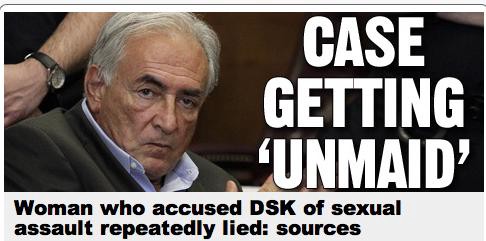
The rumors have it that Dominique Strauss-Kahn is getting released on his own recognizance today, from his current state of house arrest. I read last night’s Times story three times (“Strauss-Kahn Case Seen as Near Collapse”), and it’s one of those cases where the reporters are conveying more than they can say; it’s good reporting and also a really poorly edited piece of garbage? Because it doesn’t actually explain the situation that would result in Strauss-Kahn’s change in bail status. Let us sort the anonymous “law enforcement” claims about the accuser from most to least serious!
• “the woman had a phone conversation with an incarcerated man within a day of her encounter with Mr. Strauss-Kahn in which she discussed the possible benefits of pursuing the charges against him.” This is the most interesting thing, as it was recorded, and is the actual kind of thing that can be used in court.
• “the accuser has repeatedly lied, one of the law enforcement officials said.” These lies are not explained or listed, except for some conflicts regarding her asylum application.
• a “number” of men put something like $50,000 in her bank account each year for two years. One of them was arrested for having a lot of drugs. She said one of these men was her fiancé.
• “she was paying hundreds of dollars every month in phone charges to five companies.” I think this one is an insinuation that goes unelaborated?
• She said she was raped in her asylum application but the application contains no note of that, and she said she had been genitally mutilated before she arrived in America but her “account” differs from her formal application for asylum.
Annnnnnd that’s it. You know what would be useful? Evidence presented in a court of law. Oh yes! The American way, so hated by French intellectuals.
Anyway, the Post comes up with a “law enforcement official” that says “She’s a con artist.” Perhaps she is!
And: “They have unearthed photographs of her drinking and partying, despite her professed Muslim faith.” And if we learned anything from New York’s last messy public rape trial, it’s that you certainly can’t rape ladies who drink.
On Things Just Not Working Out
On Things Just Not Working Out
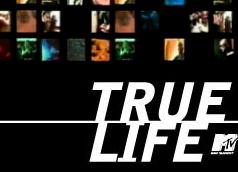
“The payoff of surviving your 20’s has to be that when you make mistakes or fall down the stairs, literally or figuratively, you don’t think of yourself as a person who makes mistakes or falls down the stairs. There’s too much historical evidence that you are not always the one: sometimes I am the one, sometimes he’s the one. Your hyperhidrosis ain’t shit, girl, compared to the cystic acne over there and the IBS way over there and the narcolepsy in the back. But of course it’s all there is, until you become Larry David (the metamorphosis starts early, but the progression is slow and almost imperceptible (only remarked upon at random intervals); you won’t die of it, you’ll die with it).
— Tess Lynch had a bad day yesterday.
What Would Princess Diana Be Doing If She Were Alive Today?
“I can see her in pale grey, maybe, with a wide-brimmed hat from under which that long, slow, slightly sarky smile would flicker momentarily in Camilla’s direction…. before coming back to rest once more on the young couple.”
— Oh, thank God, now Julie Burchill is here to tell you what Princess Diana would be doing if she were alive today.
Classic Live Concert Screamers (And Me)
Classic Live Concert Screamers (And Me)
by Alex Schmidt
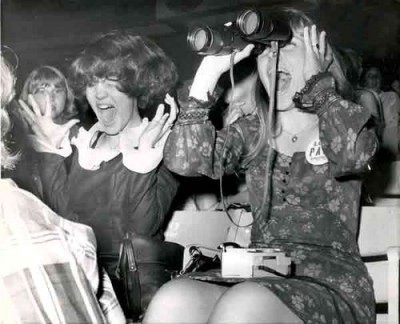
Just about ten years ago, on June 27, 2001, I saw the first of what would become many Radiohead shows, at the Shoreline Amphitheater in San Jose. My friend May and I had fantastic seats — 3rd row, I think — and it remains one of the best concerts I’ve seen. It was so face-meltingly awesome, in fact, that I screamed at the top of my lungs every five minutes for the duration of the show.
How do I recall that detail?
Soon after, a friend gave me a recording of said show. My 21-year-old enthusiasm is audible for the entire three hours of the recording. We’re talking about a 22,000-person stadium, and while you do hear a low sustained pitch of thousands of people screaming in the background, ringing out clearly above it all is my lone, nasal shriek. Maybe it’s ’cause of how close we were to the stage.
In the pantheon of live recordings, this wasn’t a super notable concert — it’s not like you hear “Shoreline 6/27/01” played on the radio. But there are other, more well-known live recordings (some of them to the exclusion of the studio versions) that do feature memorable screamers, whistlers and squealers. Probably the most famous one is the guy who shouted “Judas” at Bob Dylan’s now legendary Manchester concert in 1966; a reporter at The Independent tracked him down a while back. (Finding him was harder than you might think.)
A notable concert screamer is the aural equivalent of the random person we end up staring at in a crowd scene, like the bystanders in the Zapruder film. At some point we have an urge to scrutinize these people who’ve become known to a wider world by pure happenstance of being there — and making a bit of noise.
In the case of the live event, these folks are worthy of some praise. There’s an element of “behave yourself” at live events, especially, though not only, if you know they’re being recorded. The success of the event depends on the audience’s cooperation; not only can a lone wacko ruin the experience for other concertgoers, but a determined one can preempt whatever creative thing a performer is trying to do. Still, the concert-screamer upends the “behave” dynamic, keeping things from getting too lemming-like. Even if they do sometimes piss off others, they add a nice sense of anarchy and randomness to the evening. That’s why their squeals (as long as they’re not sustained for the entire show) are cool on recordings — they remind you that the moment was real, and that real moments in time are not perfect.
The concert screamer is a proxy — able to express the thing that you, too, might have wanted to if you had been there or, if you were there, didn’t have the guts to. So here, for your random listening pleasure, are just a few of the notable concert screamers on record:
Bob Marley, “No Woman No Cry” — Live at the Lyceum, London, 1975
A well placed whistle during a musical interlude, heard from 4:45–4:50.
Simon & Garfunkel, “50 Ways to Leave Your Lover” — The Concert in Central Park, 1981
It’s not terribly loud, but I always anticipate the little yelp during the quiet moment from 1:48–1:49.
Eric Clapton, “Layla” — MTV Unplugged, 1992
Oh, the subversiveness of the concert screamer at an MTV Unplugged performance! Although I’m not wild about this guy’s scream at 0:57 — it actually feels a little self-conscious.
Cheap Trick, “I Want You To Want Me” — Budokan, Tokyo, 1978
This squealer manages to stand out twice amid complete insanity. ‘A’ for effort, at 1:20 and1:38.
Van Morrison, “Just Like A Woman” — Pacific High Studios, San Francisco, 1971
An excellently placed and tightly executed “whoo,” heard right after a perfect apex of the song, at 3:58.
And finally, not to place myself in the ranks of the classic screamers above, but for humor and embarrassment’s sake, a few clips of Radiohead’s Shoreline performance from 6/27/01 in San Jose, CA. My shrieks can be heard at 0:11, 0:28, 1:43, 1:50, 3:38 and 5:33.
When I first heard this recording, I felt proud — like I had been immortalized in the annals of one of the best bands of all time, part of the permanent and inescapable record of the Kid A/Amnesiac tour. In some way, I still do. But more than that, I pity the hardcore fans who own the recording — and worse, the folks who shared this live experience with me. Is it possible you’re out there reading this? Is it possible you noticed? Well, sorry ‘bout that.
Alex Schmidt is a reporter and producer based in Los Angeles. She files regularly for NPR, and irregularly for other places, about all manner of topics. You can follow her on twitter. She’d like to thank Jody Avirgan and Will Hattman for pointing her to some of the above concerts.
Germans Will Attempt Informality In Orderly Fashion
“A tourist office in a Bavarian village plans to offer German-speaking visitors the choice of being addressed by the formal ‘Sie’ or the informal ‘du’ form. Tourists can vote with their feet by going to the right counter. Is this a sign that the language’s rigid rules on the matter are starting to be relaxed?” Sure, why the hell not.
"Why Do You Keep Getting Hit By Lightning?"
I suppose when a man has been struck by lightning six times it is only logical to ask him if he has any idea why it happens so frequently, but it still kind of feels like blaming the victim a little. [Related]
Italian Prime Minister Is Energizer Bunny Of Sex Doing: Physician
“Silvio Berlusconi may be 74 but he is as robust as a 60 year old and is capable of having sexual intercourse up to five times a day, his personal doctor has said.”
Tina Brown, Fanfiction And Princess Diana: Nine Observations
by Michelle Dean
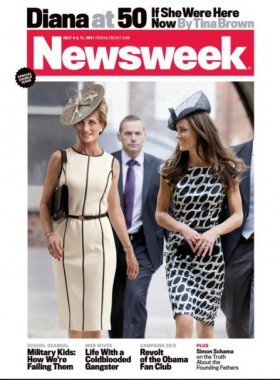
1. Before we proceed, we might all need to take a moment to acknowledge that we’ve reached the point in our culture where former editors of the New Yorker are writing fanfiction. Publicly, I mean; who knows what William Shawn scribbled in his most private notebooks, and in some sense who wouldn’t want to know, how many miles to Babylon, etc. But still. Fanfiction, in a “news magazine.”
2. Obviously there’s nothing wrong with fanfiction qua fanfiction. I’m not into it myself, but I read serial killer profiles at 3 a.m. when I can’t sleep, so no judgment. But the communications scholar Henry Jenkins has an awfully neat way of looking at it: “Fan fiction is a way of the culture repairing the damage done in a system where contemporary myths are owned by corporations instead of by the folk.” I’m skeptical of the “free culture” ethos that informs this kind of argument, mostly because I have absolutely no idea who this “folk” is or, concurrently, in what other time “myths” were “owned” by said population.¹ And I’m also (and probably more importantly) unclear on the precise causal connection between folk-ownership and the production of really good art. Whatever, it’s good that people are writing; it’s good that people are reading. And it’s certainly plausible that a hundred thousand people typing away on the Internet will eventually produce a better “Supernatural” story arc than the writers are capable of doing.
3. But try to apply Jenkins’ quote to what Tina Brown’s been up to. I’ll wait.
4. The difference between acceptable fanfiction and terrible, horrible, no good, very bad stuff like “Diana at 50” is simple. Fanfiction, in my limited understanding, is about elaborating on the lives of fake people. It’s a whole other ballgame when we’re talking about real ones. Especially ones who are, themselves, something of a very weak center in the storms they provoked.
5. Oh, of course Diana had — and, bizarrely, often seemed to want — the kind of celebrity that splits a person in two, such that only one half is flesh and the other all narrative and fantasy. The weekend she died I was at a friend’s cottage in the Gatineau Hills. It was a characteristically Canadian summer home: charming, rickety and governed by the ethos that electricity and indoor plumbing are for suckers. We would spend our time at this place reading the stacks of tabloids lining the cottage’s shelves — not just the Enquirer, but straight-up News of the World, alien-baby stuff, which were, I was told, collected from the owner’s neighbors, who were apparently aficionados. (The reason the cottage owners kept them was, ostensibly, for fires, which seems less plausible to me each new time I consider it.) After a weekend of trading these around, competing to find the most silly, outrageous story, and having items about Diana favoured to win that competition more than once, I think we could be forgiven for completely disbelieving the younger brother who gave us the news of her death when we got home. He ran out to the car, excited to break the news. Because he knew about the tabloids at the cottage, we assumed he was shining us on. But then we should have known better than to expect Diana to live out her days in a manner appropriate to your ordinary, everyday, average person living out the general banality that is human existence. Honestly, an end like that was a better fit for the script we’d spent the weekend poring over.
6. There’s been a lot of handwringing over the Newsweek cover’s use of the words “dignity” and “respect,” but it’s hard to believe someone like Diana would have been insulted by this kind of thing. My best guess is that Brown meant this all as a compliment. I can’t have been the first to notice that the photoshopped version of Diana bears not a small amount of resemblance to Brown herself. And that the world Brown envisions for Diana seems more or less her own: a world in which one can straight-facedly refer to “old Gorby” and claim to have a “global girlfriend set,” where wearing a “galleon-size Lady Bracknell hat” is obviously a mortal sin,² and where references to “BFFs” and “Twitter” and “Facebook” are meant to signal that even the most exalted member of the “London über-swirl of fashion and society and media”³ is totally down with the habits of we people on the pavement. You could chalk this up to some special kind of egotism on Brown’s part but of course she’s probably at least half-right; this is what happens when you’re part of that class of people who unironically believe themselves entitled to waves of glitter, a Soho loft and Ibiza sunshine, who don’t find their self-celebration unseemly even during one of the worst world economic crises in decades. In other words, the people who live in Fantasyland. And often do so by choice.
7. Oh, shut up, Americans. I agree that the monarchy is an irrational and silly institution. But, speaking from the outside, the holy-text status you all assign to your “Founding Fathers” and your Constitution is just as confusing. Ditto the rallies and the crying over the flag and the inexplicable devotion to unearthing photos of your President holding babies. (And don’t tell me that doesn’t cost you a thing. Tea Party types, who feed on this crap, are a far greater threat to progressive politics than Kate Middleton.) National myths are, after all, something like old fixtures in the run-down Victorian you’ve just bought because you loved the gabled roof. The wall sconces are ornate in a way that obviates their value for you, they certainly aren’t up to your modern tastes, but if you want to take them out you’re going to have to gut the entire interior of the house. And at some point that gets too expensive, either materially or psychologically.
8. Sure, making up crap can be a fun activity for a lazy afternoon, on the order of doodling hearts all over one’s Trapper Keeper. Here are some of my stabs at Diana’s opinions about Important Contemporary Issues: I think Diana would have hated David Foster Wallace’s fiction. I think she would have thought, frankly, that “Mad Men” was only medium-good, that really “Nurse Jackie” was the best show on television. I think she would have found Momofuku overrated. But then it’s one thing to attribute my own pop culture preferences to Diana, and another to assert, as Brown does, that Diana would have known the “right” way to have handled 9/11 or Katrina, even if she would, indeed, have arrived “first at the scene in a hard hat with a camera crew.” (Just ask Sean Penn about how well that goes over.) Diana never had much on an instinct for politics. She always struck me as a woman who was most firmly against the stomping of puppies and the maiming of children, which is, of course, an admirable set of opinions, albeit one that allows you to campaign vociferously against landmines and AIDS without having to stop spending untold amounts of money on your wardrobe.
9. And if you think I make these observations because I hated Diana, or even because I hate the “cult” of Diana, think again. I was raised by a member. My mother has read nearly every book that’s come out about Diana; I know because I usually gave them to her at Christmas or for her birthday. (Oddly, I never gave her Brown’s The Diana Chronicles, not by design, just never got around to it.) I’ve heard people complain that the elevation of Diana is nothing more than a British/Canadian/American culture’s over-valuation of very silly women and their equally frivolous activities. My experience with my mother, who is a very practically minded and pessimistic sort, suggests otherwise; her sympathy always seemed less about Diana’s looks and clothes than founded in the idea that Diana was the victim of circumstances beyond her control, and who never seemed quite able to find her way out. I told her I was writing a thing about Diana and despite all that reading, despite years of our discussing, between us, the particular calibrations of the Royal message throughout the annus horribilis of 1992, the intractability of that terrible marriage, the likelihood that her children could grow up normal, despite all of it, here is what my mother said: “Well, I didn’t really know the woman.” Which sums up the real tragedy of the matter. Diana never seemed to know herself either, and strangely, most of the time, didn’t even seem to want to.
¹ I suppose I could check it, but I didn’t actually buy the book or anything like that, I got the quote from the “folk” on Tumblr.
² Lady Bracknell is fucking awesome and I’ll hear no bad words spoken of her. (Maybe I should try fanfic.)
³ I like how the phrase “über-swirl” indicates that the primary attribute of a milieu that sounds like total hell is that it is really very swirly.
Michelle Dean’s writing has appeared, among other places, at Bitch, The American Prospect and The Rumpus. She sometimes blogs here.
